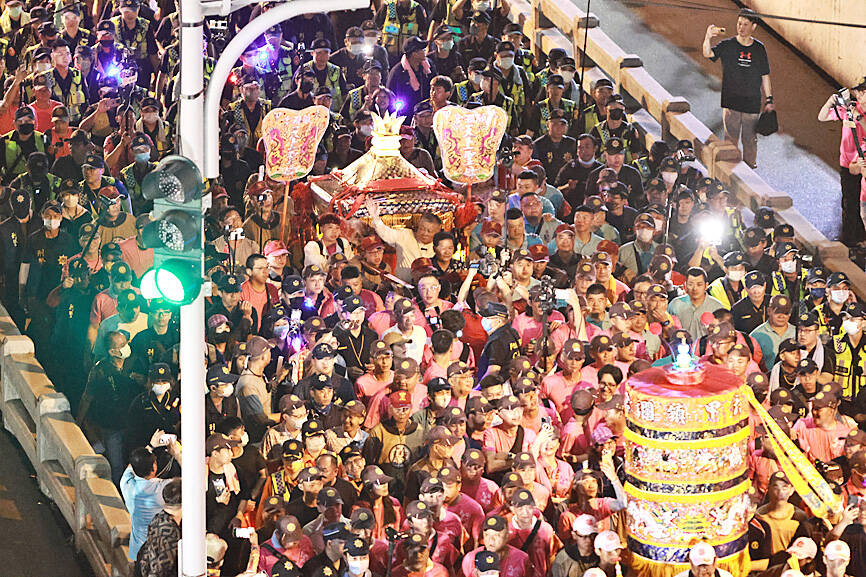The Taichung City Police Department on Friday announced that it would use drones and other technology to enhance public safety and manage crowds during this year’s Dajia Matsu Pilgrimage.
The annual nine-day, 340km procession honors the sea goddess Matsu, whose statuette is enshrined at Jenn Lann Temple (鎮瀾宮) in Taichung’s Dajia District (大甲).
The pilgrimage is set to begin at 11pm on Friday, with devotees traveling through Changhua, Yunlin and Chiayi counties before returning to Jenn Lann Temple on April 13.

Photo: Chen Kuan-bei, Taipei Times
It is one of the most renowned and widely attended annual pilgrimages in central Taiwan, alongside the Baishatun Matsu Pilgrimage in Miaoli County’s Tongsiao Township (通霄).
The Taichung City Police Department said it has arranged additional law enforcement units to protect the main Matsu palanquin, and officers with camcorders would be deployed to help ensure the safe and orderly passage of the procession.
To ensure public safety during the pilgrimage, authorities would implement enhanced protection measures to prevent altercations and violent incidents, target pickpocketing and theft, and deploy officers at major intersections to direct traffic as the procession moves through Taichung, the police department said.
New measures this year include the expanded deployment of officers equipped with camcorders, drones, high-resolution cameras and “M-Police” mobile devices that enable real-time data sharing and online coordination, it said.
All systems would be integrated into a central digital platform managed by a command center for rapid response and oversight, it added.
Violence and group clashes have occurred in previous years, often involving neighborhood religious groups or gang-affiliated factions attempting to forcibly redirect the Matsu palanquin to visit their local temples or altars.
In traditional folk belief, such “close visits” are thought to bring divine blessings and good fortune for the year ahead, fueling intense competition among groups along the route.
Officers have visited local temples and neighborhood groups along the pilgrimage route to conduct inspections, issue safety guidance and assess the need for police deployments, the police department said.
Participants have been warned that displaying gang-related symbols or imagery is strictly prohibited, it said, adding that any involvement in violence or disturbances would lead to prosecution under laws governing public order.
As large crowds — including worshipers from across Taiwan — are expected to line the route, many carrying significant amounts of cash, police have stepped up patrols to deter theft and pickpocketing.
Authorities also advised caution in parking areas, as criminals have been known to smash car windows to steal valuables left inside.
Meanwhile, temple management at Gong Tian Temple (拱天宮) in Tongsiao on Friday night announced that more than 100,000 people have registered to take part in this year’s Baishatun Matsu Pilgrimage.
The procession is scheduled to begin on May 1, traveling from Baishatun Temple (白沙屯宮) to Chaotian Temple (朝天宮) in Yunlin County’s Beigang Township (北港).
Registered participants pay a fee to receive temple-blessed items and accessories, which also identify them as official pilgrims and grant them priority arrangements during the event.
However, temple officials said that anyone is welcome to join and walk along the route regardless of registration.

Alain Robert, known as the "French Spider-Man," praised Alex Honnold as exceptionally well-prepared after the US climber completed a free solo ascent of Taipei 101 yesterday. Robert said Honnold's ascent of the 508m-tall skyscraper in just more than one-and-a-half hours without using safety ropes or equipment was a remarkable achievement. "This is my life," he said in an interview conducted in French, adding that he liked the feeling of being "on the edge of danger." The 63-year-old Frenchman climbed Taipei 101 using ropes in December 2004, taking about four hours to reach the top. On a one-to-10 scale of difficulty, Robert said Taipei 101

Nipah virus infection is to be officially listed as a category 5 notifiable infectious disease in Taiwan in March, while clinical treatment guidelines are being formulated, the Centers for Disease Control (CDC) said yesterday. With Nipah infections being reported in other countries and considering its relatively high fatality rate, the centers on Jan. 16 announced that it would be listed as a notifiable infectious disease to bolster the nation’s systematic early warning system and increase public awareness, the CDC said. Bangladesh reported four fatal cases last year in separate districts, with three linked to raw date palm sap consumption, CDC Epidemic Intelligence

US climber Alex Honnold left Taiwan this morning a day after completing a free-solo ascent of Taipei 101, a feat that drew cheers from onlookers and gained widespread international attention. Honnold yesterday scaled the 101-story skyscraper without a rope or safety harness. The climb — the highest urban free-solo ascent ever attempted — took just more than 90 minutes and was streamed live on Netflix. It was covered by major international news outlets including CNN, the New York Times, the Guardian and the Wall Street Journal. As Honnold prepared to leave Taiwan today, he attracted a crowd when he and his wife, Sanni,

Taiwanese and US defense groups are collaborating to introduce deployable, semi-autonomous manufacturing systems for drones and components in a boost to the nation’s supply chain resilience. Taiwan’s G-Tech Optroelectronics Corp subsidiary GTOC and the US’ Aerkomm Inc on Friday announced an agreement with fellow US-based Firestorm Lab to adopt the latter’s xCell, a technology featuring 3D printers fitted in 6.1m container units. The systems enable aerial platforms and parts to be produced in high volumes from dispersed nodes capable of rapid redeployment, to minimize the risk of enemy strikes and to meet field requirements, they said. Firestorm chief technology officer Ian Muceus said